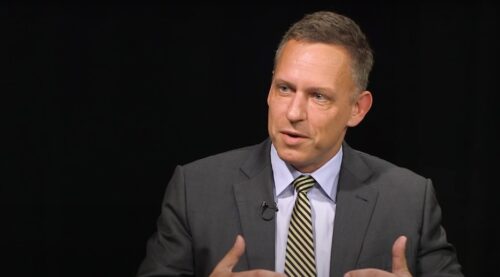One in particular.
Two hundred eleven staff members of the Open Society Foundations (OSF) reportedly sent a letter in April to its president, Patrick Gaspard, and its vice president, Leonard Benardo, protesting its publicly announced $130 million commitment to respond to the coronavirus. The letter touches on important questions facing philanthropy in general, and it raises some questions about OSF in particular.
The full letter has not been fully disclosed, but it has been described—first by The Chronicle of Philanthropy’s Alex Daniels and subsequently by The Washington Post’s Will Hobson. In the letter, the OSF staffers object to any characterization of the emergency fund as newly created—when in fact it was essentially cobbled together from ungranted, but budgetarily allocated amounts in other, already-existing program areas. The humanitarian aid, in other words, will essentially supplant that which would have gone to furthering OSF’s largely social-justice agenda.
The larger questions arising from the protest is one facing all of philanthropy, of course, on both the left and the right. They are about what to do in the current crisis. Simplifyingly summarizing the options: Shift resources? Spend more to meet new needs despite a resulting decline in the underlying corpus? Or “stay the course” and try to “weather the storm” with current causes and projects? OSF has apparently made its call, opting to shift.
An “antithetical” shift, from staff
In the letter, OSF’s unionized staff members object to this shift—in the process, raising some albeit-narrower, but still-serious questions about how best to go about doing grantmaking. As reported by Daniels, the letter says the shift ignores the “expertise and deep relationships” that they, the staff, developed with grantees. “The creation of a centralized fund, removed from this deep knowledge base, seems antithetical to the practices and principles needed to meet this moment.”
As reported by Daniels, “By taking grant money away that had been verbally committed to, the foundation ignored the ‘realities, values, and accepted practices of responsible grant making,’ the letter states, adding that any such cuts in grants should be restored in 2021.” As described by Hobson, the letter says “that the money devoted to covid-19 relief efforts includes tens of millions of dollars they had promised to other organizations in verbal conversations and informal emails.”
Gaspard told Hobson that OSF, in Hobson’s words, “will be honoring all written agreements with its partner organizations and would only be shifting ‘unallocated funds.’” Hobson then quotes Gaspard as saying “I’m not aware of any commitments that were practically signed, sealed and delivered that we reneged on. … We simply made a decision that unallocated funds would be shifted.”
Authority, temptation, humility
So if OSF staff members “committed” its largesse, verbally or by informal e-mail or however, do they have the authority to do so? If not, why did they?
It’s a sometimes-overwhelming temptation for foundation staffers—being human—to personally want to look, and feel, important. This should be professionally overcome; humility helps. If foundation staffers self-interestedly step beyond their proper roles and, in fact, unauthorizedly allow groups to think they have a grant, that’s a great risk and is usually bad, for all involved—including the foundation and the groups. And the staffers.
Who do they, with their “expertise and deep relationships,” think they are?







This reminds me of the great internal fight that occurred in the Ford Foundation in the late 1970’s. A new president was selected and empowered to make changes. Until that point approval for grants was authorized by the board at various levels based on the rank of the individual program staff. The new president fired senior people and reorganized the program operation. program areas. Staff legends in grantmaking fields like the arts were let go. A new VP was created to focus on Michigan to encourage proposals from the founder’s home state.
I remember the shift being based on a revised grantmaking vision and financial difficulties. Ultimately, the board( even at a very large foundation) is legally responsible for grantmaking, not the staff. The board can make changes hopefully with advice from program evaluations, valued staff and consultants.
OSF must have had a different and not common interpretation of staff- board responsibilities. I am not aware of many foundation staff being unionized. The internal disagreements sounds like a lack of proper communication in a timely manner . Union rules may not have been followed
In the last large private foundation I served ,even though I made grantmaking recommendations with options I always knew that it was not my money and the board made the decisions. I did not want to tie my recommendations to emotional or personal connections but to the principles and values expressed by the donor and the board and lessons learned from past grantmaking activities and results. I sat with the board and responded to their questions about proposals, my analyses and recommendations.
Years ago, Chris Stone implemented a policy of decentralized grantmaking authority, which means that individual grant makers — program officers and others with “expertise and deep relationships” — have the final authority to approve grants (with a ceiling for approval amounts, depending on the level of the individual). In practice, this means that “final approval” — absent any legal compliance issues — for a huge number of grants is done at the level of program officers. If you do not understand this about OSF, then you are not very qualified to cast aspersions on OSF staff.
OSF may be different than other foundations that you may be more intimately familiar with – I do not know. What I do know is that dissent of this nature is not repressed, but rather appreciated and encouraged — a rare characteristic among institutions of any kind. This is a tradition borne out of Soros’ fundamental belief in open society values, and implemented in practice within the foundation. That also may be a difference from the experience of other foundations, but I leave that to others to judge.